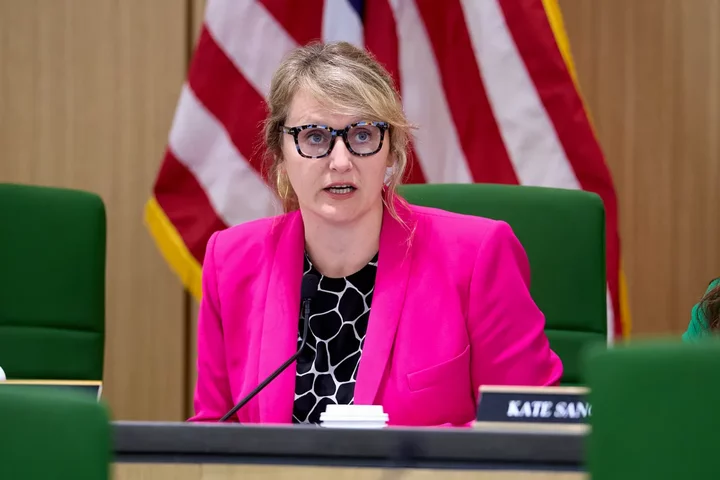Eureka City Council Unanimously Approves Controversial West Side Five-Plex
Jacquelyn Opalach / Wednesday, Aug. 21, 2024 @ 5:07 p.m. / Local Government
Rendering of the five-plex by Adams Commercial General Contracting Inc.
Last night, the Eureka City Council resolved the fate of a controversial five-plex proposed for a property on Buhne Street, which has stirred up controversy in the neighborhood. Last night’s meeting unearthed bad blood between the neighbors of the project and its developer, Adams Commercial General Contracting (ACGC) Inc.
After bouncing between review authorities – initially being denied by the Design Review Committee but later earning approval from the Planning Commission – ACGC’s five-plex landed before the City Council after neighbors appealed the commission’s approval. The two-story building will fill a vacant 9,000 square-foot parcel with five apartments (one one-bedroom unit, two two-bedroom units and one three-bedroom unit), each with its own garage.
Neighboring owners of an old Victorian house claim the project will be detrimental to their health and safety, primarily by shading their home and exacerbating mold conditions.
The Design Review Committee was tasked with approving or denying design review for the project at its May 8 meeting. The committee is only permitted to deny a project if it is found to be harmful to public health and safety, or if it does not meet the seven criteria of design review (which inform design consciousness around stuff like the fitting in with the neighborhood, landscaping and pedestrian environment). The committee opted to deny the project based on the neighbors’ concerns over their own health and safety.
Eureka Director of Development Services Cristin Kenyon appealed the denial due to conflicts with the Housing Accountability Act, which directs local governments to approve all housing developments that satisfy local objective design standards. Because Eureka has no objective standard related to sunlight or shading on neighboring properties, the City cannot legally deny the design, Kenyon explained at last night’s meeting. The City has found that the design is consistent with the zoning code, which was written to protect public health, safety and welfare.
“So in our eyes, if it’s consistent with the code […] then we feel that the development is consistent with protection of health, safety and welfare,” Kenyon said.
When the issue came before the Planning Commission on June 27, members voted to overturn the committee’s denial and conditionally approve the design.
On July 8, Dan Reid, owner of the adjacent Victorian, appealed the conditional approval. Reid argued that a standard objective has been met because shading over his home will be inevitable if the project is approved. Reid also argued that design review criteria state that design applications must minimize adverse impacts on neighboring properties where possible, which ACGC could do by decreasing the height of the building or flipping the design.
At last night’s meeting, Councilmember Leslie Castellano asked whether the City Council has ever required a developer to change a design that met all objective standards. Staff couldn’t recall such an event. Design review for residential projects rarely escalates to the City Council, City Manager Miles Slattery said, adding he couldn’t remember this happening over the decade he’s regularly attended council meetings.
Council member Scott Bauer asked what the legal implications might be if the council opted to reject the design.
Because the project is in “complete compliance” with the city’s guidelines, City Attorney Autumn Luna said, “to deny at this point, I think, could subject the city to a challenge.”
During the public hearing, the couple – Reid and Stacia O’Neil – made their case to the council. Their arguments are spelled out in letters and Reid’s appeal – see those documents here and here – but during public comment the couple reiterated their interpretations of the relevant laws, codes and processes. In sum, they argued that changing the design would not jeopardize the Housing Accountability Act, and that the council has an obligation to deny or require a change to the design because of safety hazards, from mold risk to fire safety to mental health.
The design poses a fire hazard to the house, O’Neil said, because shutting off the power and cutting through both property’s fences in an emergency would take time.
“[We’re] looking at a 20-minute delay. Our Victorian will burn to the ground, my children will not be able to escape. That’s going to be on you,” O’Neil said.
“They are going to shade my property for all eternity, which will cause problems: mental health problems, well-being problems, mold problems, desirability for being onto my property and resale problems.”
During his turn, Reid said he would be entitled to compensation from the City for damage to his property.
“In this instance, the City of Eureka is making a decision that will have a negative impact on the use and enjoyment of our property.” Reid said a realtor has confirmed that his property value will drop following development of the five-plex.
“I see that the council is being encouraged to steamroll my property rights because the proposed building will only impact my residence, as opposed to the buildings on the other side of the proposed project,” Reid said. “As a longtime resident of Eureka and the owner of a 132-year-old home, this really hurts.”
After hearing from the public, Councilmember Renee Contreras-DeLoach asked whether ACGC has considered flipping the design of the building as its neighbors are requesting.
ACGC’s Real Estate Development Director & Community Liaison Raelina Krikston said that the current design orientation creates the least impact on surrounding neighbors, noting that there are five other families near the site.
That said, flipping the design isn’t as simple as it sounds, Krikston said. “To flip the property would be asking us to re-engineer the whole entire project. There’s grading, there’s surveying, there’s every single design aspect that’s made… it’s not just a quick copy/paste.”
Before making those points, Krikston said something else: there was never any discussion between ACGC and these particular neighbors because the residents allegedly threatened the developer years ago over a different project.
“Ten years previously, when another development was built, the owner of the company was physically threatened by the property owner,” Krikston said. “So any initial conversations with the neighbor was avoided, just because we knew that the nature would be combative.”
Mayor Kim Bergel invited the neighbors to respond.
“That’s an absolute lie,” O’Neil said, clearly shaken, adding that the only contact she’s ever had with ACGC founder Will Adams was at the May 8 commission meeting, after the design was initially denied.
“I saw him in chambers and I turned around when it was denied. I said, ‘Please work with us,’” O’Neil said. “He said, ‘F you, lady.’ That’s the only contact. Then we got a restraining order in place against him and this woman here [Krikston] for harassing us. That’s the story.”
O’Neil said the situation has been extremely stressful, time consuming and expensive (filing the appeal fee was $800, she said) for the family.
The turn toward accusations between the two parties shifted the rest of the council’s conversation.
Councilmember Contreras-DeLoach said it is frustrating to see the situation escalate – with the couple investing time, money and emotions into the appeal process – when the City’s hands are essentially tied.
“I think we need to be a lot more transparent about that as a city,” Contreras-DeLoach said.
“There needs to be some kind of discussion about that so that this type of thing doesn’t really occur, because we knew the end from the beginning. And they are in here, obviously very distressed and very upset, hoping that we’re going to make a different decision – but we’re not, because we’re in alignment with state law, and if we make an alternative decision then we open ourselves up to litigation where we would probably lose. And I think that’s frustrating for me.”
Contreras-DeLoach and other councilmembers said it’s disappointing to see the complete absence of communication between the two parties.
“I think there’s a right way and a wrong way to do things like this. I don’t think that not engaging the people around a project is an appropriate way to do it,” she said. “I also think it’s incredibly inappropriate to have gotten up here and to make an accusation against this couple that’s here.”
Councilmember G. Mario Fernandez echoed Contreras-DeLoach’s comments, saying that there aren’t grounds to deny the design and the city must abide by state law. He also agreed that the process and communication should be improved.
“I think we can improve this process overall,” he said. “I think there needs to be some sort of mediation before we get to this level of decision.”
Councilmember Castellano made a motion to uphold the Planning Commission’s conditional approval of the design and to exempt the project from the California Environmental Quality Act. It passed unanimously.
The Outpost will publish a report on the rest of last night’s meeting, which included a discussion on a proposed Vacant Building Ordinance, tomorrow.
BOOKED
Yesterday: 9 felonies, 10 misdemeanors, 0 infractions
JUDGED
Humboldt County Superior Court Calendar: Friday, Feb. 13
CHP REPORTS
No current incidents
ELSEWHERE
RHBB: Snow Could Impact Travel From Del Norte to Mendocino and from Eureka to Redding
RHBB: CDFW Accepting Applications for Spring Elk Hunts in Del Norte County
RHBB: Shasta-Trinity & Six Rivers National Forests seeking public input on OHV grant applications
California Tried to Make Google Pay News Outlets. The Company Cut a Deal That Includes Funding AI
Jeanne Kuang / Wednesday, Aug. 21, 2024 @ 3:34 p.m. / Sacramento
Assemblymember Buffy Wicks played a key role in negotiating a deal between media outlets and tech companies. She speaks during a committee hearing in the Capitol Annex Swing Space in Sacramento on Aug. 15, 2024. Photo by Fred Greaves for CalMatters
California lawmakers are abandoning an ambitious proposal to force Google to pay news companies for using their content, opting instead for a deal in which the tech giant has agreed to pay $122.5 million to support local media outlets and start an artificial intelligence program.
The first-in-the-nation agreement, announced today, promises $135 million for local journalism across California over the next five years, but represents a significant departure from the bill pushed by news publishers and media employee unions earlier this year.
Instead of Google and Meta being forced to negotiate usage fees with news outlets directly, Google would deposit $55 million over five years into a new fund administered by UC Berkeley to be distributed to local newsrooms — and the state would provide $70 million over five years. Google would also continue paying $10 million each year in existing grants to newsrooms.
The Legislature and the governor would still need to approve the state money each year; the source isn’t specified yet. Google would also contribute at least $17.5 million toward an artificial intelligence “accelerator” program, raising labor advocates’ anxieties about the threat of job losses.
Publishers who supported the bill said it was still a win.
“This is a first step toward what we hope will become a comprehensive program to sustain local news in the long term, and we will push to see it grow in future years,” Julie Makinen, board chairperson of the California News Publishers Association, said in a statement.
But unions representing media workers accused the news companies and lawmakers of settling for too little.
The agreement replaces two bills lawmakers had pursued the last two years as they tried to secure a cut of tech money to prop up California’s struggling local news industry. Following a nationwide trend, media companies have hemorrhaged jobs over the past two decades as advertisers fled print media for the internet and technological advancements reshaped how readers consume news.
To try to keep their readers, publications increasingly rely on social media and online search. Google controls the lion’s share of search in a way the U.S. Justice Department and one federal judge have said violates antitrust law.
The proposals to impose fees on Google’s use of news content in its search results prompted a flurry of tech company lobbying. In 2023, for instance, Google spent more than $2.1 million lobbying lawmakers against those bills and others — more than double what it spent in the Legislature two years prior, according to a CalMatters review.
The first bill, introduced in February 2023 by Oakland Democratic Assemblymember Buffy Wicks, would have required platforms such as Google and Meta to either pay a fee or negotiate with news outlets for using their news content.
It was sponsored by the California News Publishers Association, whose members include major newspapers including the San Francisco Chronicle and the Los Angeles Times. Australia and Canada both passed similar measures in recent years. The bill passed the Assembly last year, but Wicks paused it to try to bridge a split among media companies over how the money would be divvied up.
Google has argued the bill would unfairly force it to pay for sending free traffic to news sites, and disadvantage smaller sites. In a legislative hearing in June, the company’s vice president of global news partnerships, Jaffer Zaidi, called the proposal “profoundly unconstitutional and problematic” since it could compel platforms to show content that they were forced to pay for.
The second bill, introduced this February by Orinda Democratic Sen. Steve Glazer, would have imposed a fee on major tech platforms to provide news outlets a tax credit to employ local journalists.
In response to the Wicks bill, Google temporarily removed links to California news websites from its search results and in response to the Glazer bill, Google said it might stop funding nonprofit newsrooms nationwide. At the time, Senate Democratic leader Mike McGuire called the threats “an abuse of power.”
Glazer shelved his bill in May, after failing to scrounge up the two-thirds majority he needed, and said he would focus on trying to improve the Wicks bill.
Negotiations ramped up over the summer.
Tech companies doubled down on threats to stop linking to news sites in California if Wicks’ bill passed, and publishers had an incentive to reach an agreement that would give them the money quicker. In Canada, the government has estimated Google is paying $73 million a year to news outlets under its new journalism industry law, but proponents of California’s deal say the money has been slow to be distributed.
Another factor: Some proponents said it was unlikely Gov. Gavin Newsom, who pledged no tax increases this year, would sign Wicks’ bill, which could be seen as a tax on tech companies. Newsom in a press release today praised the deal, though his spokesperson Alex Stack on Tuesday denied the governor was involved or had taken a position on the bill.
“This agreement represents a major breakthrough in ensuring the survival of newsrooms and bolstering local journalism across California — leveraging substantial tech industry resources without imposing new taxes on Californians,” Newsom said in a statement.
By committing to pay into the new UC Berkeley fund, tech companies succeeded in killing the bill they opposed while appeasing both legacy print media and some digital-only news outlets with five years of support. The agreement is similar to a deal Google cut in France more than a decade ago, creating a “digital publishing innovation fund” when publishers there pushed for regulations.
Wicks, in a statement announcing the deal, called it “a cross-sector commitment to supporting a free and vibrant press.”
But the Media Guild of the West, which represents newspaper reporters in Southern California, slammed the agreement and accused publishers and lawmakers of folding to Google’s threats.
“Google won, a monopoly won,” said Matt Pearce, the group’s president. “This is dramatically worse than what Australia and Canada got … I don’t know of any journalist that asked for this.”
The guild said it was particularly concerned the deal involved a program promoting artificial intelligence technology, which it saw as a concession to the tech industry that could result in a further loss of reporting jobs.
The AI program appears to only be partly related to journalism: In its announcement, Wicks’ office said the program will give businesses, nonprofits and researchers “financial resources and other support to experiment with AI to assist them in their work” addressing challenges such as environmental issues and racial inequities. It would also create “new tools to help journalists access and analyze public information.” OpenAI will contribute tech services, said former lawmaker Bob Hertzberg, who helped negotiate the deal, and proponents expect other tech companies to join in.
Others, including an association of mostly smaller, digital news outlets, said the threat of tech platforms refusing to link to news articles would have been devastating.
Chris Krewson, president of Local Independent Online News Publishers, pointed to Canada, where Facebook no longer links to Canadian media in response to the new law there. That caused readership and ad revenue to plummet for small news outlets, Krewson said.
The organization gets significant grant funding from Google and Meta; CalMatters CEO Neil Chase, an association board member, last weekend urged member publications to support the deal.
“I just don’t know that this industry should be in the position of saying no to any help it can get,” Krewson said. “And I don’t think it makes us more or less reliant (on tech platforms) than we already have been.”
###
CalMatters data reporter Jeremia Kimelman contributed to this story.
CalMatters CEO Neil Chase has been involved in the deal as a board member for Local Independent Online News Publishers. His views do not necessarily reflect those of the organization, newsroom or its staff. The CalMatters staff is represented by the Pacific Media Workers Guild, which is separate from the Media Guild of the West and says it has not been involved.
CalMatters.org is a nonprofit, nonpartisan media venture explaining California policies and politics.
(UPDATED) Birth Center at Mad River Community Hospital Will Close in October
Ryan Burns / Wednesday, Aug. 21, 2024 @ 1:50 p.m. / Health Care
Photo via MRCH.
###
UPDATE, 5 p.m.:
Mad River Community Hospital issued the following press release:
Leadership at Mad River Community Hospital has made the difficult decision to suspend labor and delivery services in October 2024. In the interim, MRCH will continue to offer labor and delivery (L&D) services for both scheduled and unscheduled deliveries. The suspension of L&D services will not affect non-L&D gynecological services, such as hysterectomies, laparoscopies and tubal ligations, services that MRCH will continue to offer.
”This is one of the hardest decisions I have made in my tenure as CEO,” said Douglas Shaw. “Mad River has been the premier L&D provider for Humboldt County for many years. However, over the past four years, volumes have declined significantly to the point where we are performing, on average, less than 25 births per month. We used to average 60-plus births per month, which was necessary to fund the service line. At our current volume, the L&D has been sustaining a seven-figure annual loss for the past several years. When the decline in volume is combined with inadequate and stagnated reimbursements rates under Medi-Cal, unfunded mandates for seismic compliance, and other significant challenges for rural healthcare, the continuation of L&D service will jeopardize the hospital’s continued viability in the community. We are working with local hospitals and clinic providers to facilitate the absorption of our L&D volume.”
Mad River Community Hospital will pivot to offer other critical services to the community. These services include:
- Inpatient and outpatient psychiatric services, including breaking ground on a crisis stabilization unit in partnership with the County of Humboldt and Cal Poly Humboldt
- Re-opening of home health services
- Other specialty services in partnership with regional health systems.
“We are excited to offer additional services to the community, as each of the above listed services will help to fill a void in our local healthcare system,” said Chief Nursing Officer Melissa Long. “Mental health and Cardiology and Urology services are desperately needed in Humboldt County.”
“We are working with our L&D staff to transfer them to other areas of the hospital,” Said Long. “We have many talented staff members that can be utilized in other important departments within the hospital as we continue to grow.
###
Original post:
Mad River Community Hospital announced at a staff meeting today that its Trillium Birth Center will be closing its doors after the first week of October, according to several employees.
The closure of Mad River’s labor and delivery unit will leave St. Joseph Hospital as the only birthing center left in Humboldt County. Redwood Memorial Hospital in Fortuna closed is obstetrics program in 2021, citing declining birth volumes and operational challenges, including difficulty hiring and retaining women’s services physicians and support staff.
“Very bad news for our community,” said one nurse, who asked to remain anonymous, via email. “St Joes will not be able to absorb all the births. Well they will but it is not good.”
The pending closure of Trillium Birth Center fits into a nationwide trend that’s been described as a crisis in rural maternity care, as more than half of rural U.S. hospitals now lack labor and delivery services.
“Experts and other stakeholders said it is difficult for hospitals in rural areas to recruit and retain maternal health providers,” the U.S. Government Accountability Office reported in 2022, adding that “a higher proportion of rural patients rely on Medicaid, which doesn’t fully cover obstetric services.”
Two sources report that Mad River Community Hospital’s birth center will close on or after October 6. The Outpost has reached out to hospital administration to request more information. We will update this post once we know more.
As Feared and Predicted, Providence Will Soon Close the Acute Inpatient Rehab Unit at St. Joseph Hospital
Ryan Burns / Wednesday, Aug. 21, 2024 @ 12:34 p.m. / Health Care
A sign directs patients to the inpatient rehab unit inside the old General Hospital building on Harris Street in Eureka. | File photo by Andrew Goff.
###
###
Care providers at St. Joseph Hospital have suspected this move for weeks, but on Tuesday Providence made it official: The award-winning acute inpatient rehabilitation unit in Eureka will soon be shut down, and patients who need help recovering from strokes, surgeries, physically debilitating accidents and the like will instead be sent to Granada Rehabilitation and Wellness Center, a skilled nursing home whose owner has a long track record of problems and a reputation for short staffing and insufficient care.
As we reported last month, Providence has also canceled previously announced plans to build a new 12,000-square-foot Acute Inpatient Rehabilitation addition at Redwood Memorial Hospital in Fortuna, citing “several external factors.”
A press release issued by Providence yesterday doesn’t offer much clarity on the situation. For example, it doesn’t explain how rehab services will be impacted or how many jobs will be eliminated, if any. James Ladika, a registered nurse and union rep for the California Nurses Association, told the Times-Standard that the impacts will be widespread.
“There are very complex surgeries that we do at our facility at St Joe’s that require the best rehab care that can be provided,” he was quoted as saying. “And not having that rehab locally is going to result in people needing to either be sent out of the area or to have their recovery without that level of high-quality care.”
We sent some follow-up questions to Providence spokesperson Christian Hill and will update readers once we have more information.
Here’s the press release from Providence:
Providence St. Joseph Hospital is announcing the closure of the acute rehabilitation unit (ARU) on the campus of General Hospital in Eureka. Providence will be collaborating with Rockport’s Granada Rehabilitation and Wellness Center in Eureka to deliver rehabilitation services in Humboldt County starting on November 18.
Currently, acute rehabilitation services are located at the General Hospital campus in Eureka but due to the state’s mandated seismic (earthquake) structural standards, the General Hospital campus does not meet those standards and will no longer be able to provide inpatient services after 2024. It was our plan to move the ARU to a new building at Redwood Memorial Hospital. Construction began in 2018 but due to various external factors, the project is no longer feasible.
Providence maintains close relationships with many organizations in California that collaborate in providing rehabilitation care for patients. Rockport’s Granada Rehabilitation and Wellness Center has been a long-standing provider of skilled nursing care for Providence patients in Humboldt County and cares for hundreds of Providence patients every year.
“As a health care provider founded over a century ago, we’re committed to serving the community in a responsible and sustainable manner, allowing us to continue our Mission for the next 100 years,” said Michael Keleman, chief executive, Providence Humboldt County. “With that in mind, and with input from local stakeholders and community members – we’ve identified an innovative solution that will best serve patients. We’re excited to announce this critical collaboration with Rockport’s Granada Rehabilitation and Wellness Center to provide rehabilitation services that align with the needs of our community.”
Providence is committed to a smooth transition for all our impacted caregivers. To that end, we will work with their unions as required by current contracts on impacts to their roles including internal or external opportunities that may exist.
The Geological Survey and the Yurok Tribe are Going to Be Buzzing the North Coast With Their Low-Flying Science Plane in the Upcoming Weeks
LoCO Staff / Wednesday, Aug. 21, 2024 @ 9:43 a.m. / Science
This is the plane. Photo: USGS, public domain.
Press release from the United States Geological Survey:
An airplane operated under contract to the U.S. Geological Survey will be making low-level flights to map parts of northwestern California for about a month starting around August 21, 2024.
The survey area includes the cities and towns along the coast from approximately Humboldt Bay in the south to Crescent City in the north. Flights will cover the towns of Eureka, McKinleyville, and Crescent City with the purpose of collecting and recording geologic measurements. The survey also includes Redwood National and State Parks, as well as eight Tribal Land Areas.
Anyone observing the low-flying plane should not be alarmed. The contractor will be following all guidelines established by the Federal Aviation Administration, and the aircraft will be operated by experienced pilots, specially trained for low-level flying.
This airborne survey is designed to remotely study the geologic units that lie below the land surface. It is part of an ongoing USGS program to identify hidden features such as changes in rock types, ultimately providing a better understanding of the geology of the area for the purpose of regional earthquake and tsunami hazard assessments.
The survey will be conducted by the Yurok Tribe’s Condor Aviation in partnership with Xcalibur Multiphysics. The airplane is operated by Xcalibur Multiphysics out of Ontario Canada, which is working with the FAA to ensure flights are safe and in accordance with U.S. law.
The Yurok Tribe has worked in partnership with the U.S. Geological Survey to obtain permission to fly over Tribal Lands in the survey area.
The area to be buzzed.
Plan to Regulate Access to Online Porn in California Dies Quietly in Legislature
Ryan Sabalow / Wednesday, Aug. 21, 2024 @ 7:21 a.m. / Sacramento
Visitors to online porn sites would have had to verify their age under a bill that died last week in the California Legislature. Illustration by Miguel Gutierrez Jr., CalMatters; iStock
A bipartisan bill that would have required Californians to prove they’re adults to visit pornographic websites has died in the Senate amid concerns of potentially high costs and infringements of First Amendment rights.
Under Assembly Bill 3080, California would have joined several other states, most with conservative legislatures, that recently passed similar laws requiring some form of age verification to access online pornography.
In July, the U.S. Supreme Court agreed to hear the adult entertainment industry’s challenge to a similar law Texas enacted last year.
Despite the legal uncertainties and the prospect of liberal California aligning itself with conservative states on porn policy, the bill, by Modesto Republican Juan Alanis, had two Democratic coauthors, Sen. Susan Rubio of West Covina and Assemblymember Pilar Schiavo of Santa Clarita Valley.
It coasted through the Assembly without a single member of either party voting “no,” according to the Digital Democracy database. It passed the Senate’s Judiciary Committee unanimously in early July.
But last week, the bill did not make it out of the Senate Appropriations Committee, where it was held in what’s known as “the suspense file,” along with dozens of other controversial or costly bills.
Alanis, a former crimes-against-children detective, wasn’t happy.“This bill deserved a vote from the full Senate,” he said in a statement. “Once again, Sacramento lobbyists convinced a very few, select, powerful elected members of the Senate Appropriations Committee to make a decision to stand with those who have no problems with harming kids for greed. They should have made the courageous decision to join the overwhelming majority of my colleagues in the Legislature who would have voted to stand with our kids instead.”
The bill would have required porn websites take “reasonable steps” to ensure visitors are adults, such as having them enter a credit or debit card.
The committee’s analysis cited “potentially significant cost pressure to the state-funded trial court system” if regulators had to enforce the proposed rules. The committee noted California’s courts are facing millions of dollars in budget cuts as the state addresses a $30 billion deficit this year.
The bill also faced opposition from influential online privacy and civil liberties groups, including the Electronic Frontier Foundation and ACLU California Action. Opponents testified that the age verification requirement would violate the First Amendment and that the “more data collected, the greater the chance such data gets into the hands of bad actors.”
The Free Speech Coalition, a porn industry trade group, initially opposed the bill, but the coalition removed its opposition this summer as the bill was amended. Alison Boden, the coalition’s executive director, on Tuesday thanked Alanis for his willingness to address the porn industry’s concerns.
“We completely agree with the need to keep minors from accessing age-inappropriate content without unintentionally blocking millions of adult consumers,” Boden said in a statement. “We continue to believe this is possible and look forward to working with him and other members of the Assembly in future sessions.”
The bill’s analysis earlier this year noted that the initial measure was based on “model legislation” from the Center for Renewing America, a conservative activist group.
The organization’s website lists its motto as “For God. For Country. For Community.”
###
CalMatters.org is a nonprofit, nonpartisan media venture explaining California policies and politics.
California Law Helps Tribes Keep Kids Out of Foster Care. A New Court Ruling Strengthens Their Hand
Shaanth Nanguneri / Wednesday, Aug. 21, 2024 @ 7:20 a.m. / Sacramento
For nearly a century, California and other states forced Native American youth into boarding schools, aiming to erase their cultural practices while separating children from parents, placing them in a foster system that often left them without any ties to their communities.
It was only in the late 1970s that the federal government passed a law to protect families from separation, ensuring that child welfare agencies inquire about Native ancestry and work to keep tribes, relatives and communities together. Decades later, contested cases continue to appear regularly before California courts, where state protections are stronger than federal law.
The California Supreme Court on Monday reinforced those rules in a new decision, stressing that child welfare agencies must investigate whether children have Native American ancestry before placing them in foster care. It’s a decision that could strengthen tribes’ hand in disputes over separating families by compelling social workers to go a step further before removing a child.
Incidentally, the case turned on parents who do not claim to have any tribal affiliations or Native ancestry.
The Los Angeles Department of Children and Family Services in 2019 accused two children’s parents of substance abuse and domestic violence, eventually getting their custody terminated in court. Their mother, Angelica A., has not indicated in court documents that she is Native American, but she appealed the decision on the grounds that officials did not complete a proper inquiry into her children’s heritage. Her last name is not listed in the ruling.
By a 5-2 majority, the justices agreed with the mother, calling into question not just this family’s case, but nearly two dozen other cases involving child custody and California courts. They gave little weight to concerns over whether an additional review would make a difference in the actual placement of the children.
“The department’s inquiry extended no further than mother and father, both of whom have long standing issues with substance use disorder, even though their parents, siblings, and father’s cousin were readily available and had been interviewed by the department,” wrote Justice Kelli Evans in the majority opinion.
The justices reversed a juvenile court’s decision to terminate the parents rights’ on the condition that the agency conduct an “adequate inquiry, supported by record documentation.”
Shiara Davila-Morales, a spokesperson for the Los Angeles Department of Children and Family Services, said the department was unable to comment in time for publication.
Indian Child Welfare Act recently upheld
The issue of child custody and Native Americans has long been a point of painful history in the United States. In June 2023, the U.S. Supreme Court upheld the 1978 Indian Child Welfare Act, which regulates the removal and out-of-home placement of Native children. A July 2024 report from the U.S. Department of the Interior found that over 900 children died nationwide in forced boarding schools from 1819 to 1969.
In California, over half of Native American youth in California’s foster care system end up in non-relative and non-Native households, a number that has remained relatively steady in the past decade, according to state data analyzed by researchers at UC Berkeley. Tribes have long argued they have a necessary stake in ensuring the wellbeing of Native youth, and that social workers must make good-faith attempts to inquire about ancestry.
“Ironically, such (an) inquiry could take only a few days to complete — which is significantly faster than the nearly two years that this appeal was litigated,” wrote Michelle Castagne, executive director of the California Tribal Families Coalition, in a statement. “The court’s decision recognizes the vital role that tribes have in the lives of tribal children and families.”
Dissent emphasizes childrens’ ‘instability’
The two dissenting justices blasted the majority for taking a “formulaic approach” that “needlessly condemns these children and others like them to more uncertainty, more instability and more trauma.” The two children were taken into the care of their paternal grandparents, according to the ruling, who are ready to formally adopt them.
They wrote that the children would have been better off by resolving the case quickly.
“Nonetheless, because the department failed to ask additional family members about the children’s ancestry, my colleagues invoke a rule of automatic conditional reversal that is wholly inconsistent with the way in which California courts have assessed state law error for almost seven decades,” wrote Justice Joshua Groban in the dissent.
John L. Dodd, an attorney representing the mother, said those concerns are overblown. For far too long, he said social workers have been making inadequate inquiries about Native ancestry. It’s an often unintentional omission, he says, because investigators are juggling delicate family dynamics involving substance abuse or mental health.
Though the family he represented did not indicate having any Native ancestry, he said the case matters because it sends a message to child welfare agencies that they can’t ignore state and federal regulations.
“All the social worker has to do is ask three or four questions when the social worker is doing a report,” he told CalMatters. “So the parade of horribles that the dissent is concerned about is not going to occur, because now everybody knows that you can’t just risk it.”
The children at the center of the case are now 8 and 6 years old, according to the decision, and for the four years it has lasted they have been in their grandparent’s custody. California is home to around 350,000 Native American youth under 18, according to the First 5 Center for Children’s policy.
###
CalMatters.org is a nonprofit, nonpartisan media venture explaining California policies and politics.







